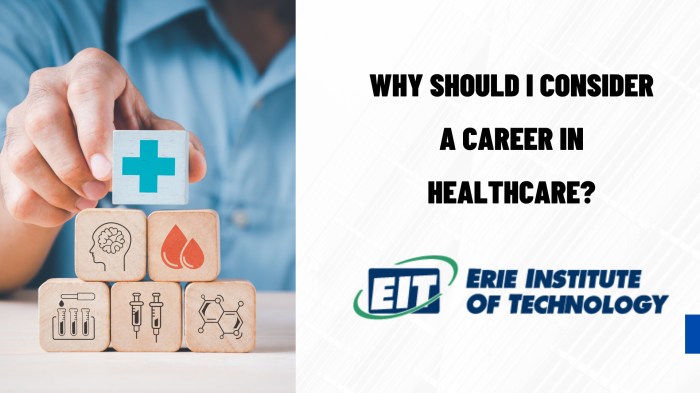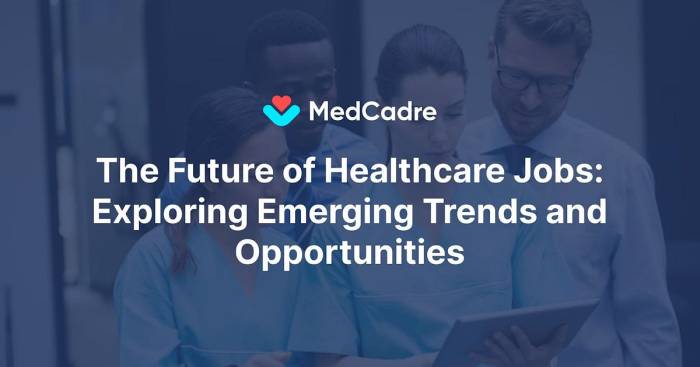Starting with Emerging Careers in Health IT You Should Consider, the following paragraphs aim to provide valuable insights and information on this dynamic field.
Subsequent sections will delve into the various aspects of Health IT careers, including trends, skills, specializations, and growth opportunities.
Overview of Health IT Careers

Health IT, or Health Information Technology, encompasses the use of technology to manage and exchange health information in healthcare settings. It plays a crucial role in improving patient care, enhancing efficiency, and advancing overall healthcare outcomes.
Key Roles and Responsibilities
- Health IT Specialist: Responsible for implementing and managing electronic health records (EHR) systems, ensuring data security, and providing technical support to healthcare staff.
- Health Informatics Analyst: Analyzes healthcare data to improve operations, patient outcomes, and decision-making processes.
- Telehealth Coordinator: Facilitates virtual healthcare services through telecommunication technologies, ensuring patients receive quality care remotely.
- Clinical Systems Manager: Oversees the integration and optimization of clinical systems to enhance patient care delivery and workflow efficiency.
Importance of Health IT Professionals
Health IT professionals are essential in modern healthcare systems as they bridge the gap between technology and patient care. By leveraging IT solutions, they enable healthcare providers to deliver more personalized, efficient, and effective care to patients. Additionally, Health IT professionals play a crucial role in safeguarding patient data privacy and ensuring compliance with regulatory standards, contributing to the overall quality and safety of healthcare services.
Emerging Trends in Health IT
As technology continues to advance, the landscape of Health IT is constantly evolving with new trends shaping the industry. These trends are not only changing how healthcare is delivered but also creating new opportunities for professionals in the field.
Increased Focus on Telehealth and Remote Monitoring
With the rise of telehealth services and remote patient monitoring, healthcare organizations are increasingly utilizing technology to provide care to patients from a distance. This trend has become even more prominent in light of the COVID-19 pandemic, highlighting the importance of virtual care options.
Use of Artificial Intelligence and Machine Learning
Artificial intelligence and machine learning technologies are being leveraged in Health IT to improve patient outcomes, streamline administrative processes, and enhance diagnostics. These technologies have the potential to revolutionize the healthcare industry by providing insights and predictions based on vast amounts of data.
Integration of Wearable Devices and Health Apps
Wearable devices and health apps are becoming increasingly popular among consumers, allowing individuals to track their health metrics and monitor their well-being. Health IT professionals are now tasked with integrating these devices and apps into the healthcare system to provide more personalized and proactive care.
Cybersecurity and Data Privacy Concerns
As healthcare organizations digitize their operations, cybersecurity and data privacy have become major concerns. Health IT professionals are now focusing on implementing robust security measures to protect patient information and ensure compliance with regulations such as HIPAA.
In-Demand Skills for Health IT Professionals
Health IT is a rapidly evolving field that requires professionals to possess a unique set of skills to succeed. Here are some essential skills needed for a successful career in Health IT:
Technical Proficiency
- Proficiency in coding languages such as SQL, Python, Java, and R
- Knowledge of healthcare information systems and electronic health records (EHR)
- Ability to troubleshoot and resolve technical issues efficiently
Analytical Skills
- Strong analytical skills to interpret data and trends in healthcare
- Ability to identify potential areas for improvement in healthcare processes
- Experience with data visualization tools to present insights effectively
Interpersonal Communication
- Effective communication skills to collaborate with healthcare professionals, IT teams, and other stakeholders
- Ability to translate technical information into layman's terms for non-technical staff
- Strong listening skills to understand the needs and challenges of healthcare providers
Continuous Learning and Adaptability
- Commitment to staying updated with the latest technological advancements in Health IT
- Ability to adapt to changes in regulations and compliance standards in healthcare
- Participation in continuous education and training programs to enhance skills
Specializations in Health IT

Health IT offers a wide range of specializations for professionals looking to carve out a niche in the field. These specializations cater to various interests and skill sets, allowing individuals to focus on specific areas of healthcare technology.
Clinical Informatics
Clinical informatics specialists focus on optimizing the use of electronic health records (EHRs) and other health IT systems to improve patient care and outcomes. They work closely with healthcare providers to streamline workflows and ensure the efficient use of technology in clinical settings.
Health Data Analytics
Health data analytics professionals analyze vast amounts of healthcare data to identify trends, patterns, and insights that can inform decision-making and improve healthcare delivery. They play a crucial role in population health management, quality improvement, and personalized medicine.
Health Information Management
Health information management specialists are responsible for maintaining and securing patient health information in compliance with regulatory standards. They ensure the accuracy, accessibility, and confidentiality of health records, playing a vital role in healthcare organizations.
Telehealth and Telemedicine
Professionals specializing in telehealth and telemedicine leverage technology to provide remote healthcare services to patients. They facilitate virtual consultations, remote monitoring, and telemedicine interventions, expanding access to healthcare and improving patient outcomes.
Career Opportunities and Growth Potential

Health IT offers a wide range of career opportunities for professionals looking to make an impact in the healthcare industry. With the increasing adoption of technology in healthcare settings, the demand for skilled professionals in this field is on the rise.
This creates ample opportunities for individuals to explore different career paths and specializations within Health IT.
Diverse Career Opportunities in Health IT
- Health IT Specialist
- Clinical Informatics Analyst
- Health Data Analyst
- Healthcare IT Project Manager
- Telehealth Specialist
Potential for Career Growth and Advancement
Professionals in Health IT have significant potential for career growth and advancement as they gain experience and expertise in the field. With the continuous evolution of technology in healthcare, there are always new opportunities emerging for skilled professionals to take on leadership roles and contribute to innovative projects.
Leveraging Skills for Career Progression in Health IT
- Continuing education and certifications to stay updated with the latest industry trends
- Networking with other professionals in the field to explore new opportunities
- Developing strong problem-solving and critical thinking skills to tackle complex issues in healthcare settings
- Gaining hands-on experience through internships or volunteer work to enhance practical skills
- Seeking mentorship from experienced professionals to guide career growth and development
Last Word
In conclusion, the discussion on Emerging Careers in Health IT highlights the vast potential and possibilities for individuals considering a career in this evolving sector.
FAQ Section
What are some common roles in Health IT careers?
Common roles include Health IT specialist, clinical informatics analyst, and healthcare data analyst.
Why is it important for Health IT professionals to stay updated with technological advancements?
Staying updated ensures professionals can effectively utilize the latest tools and systems to improve healthcare outcomes.
Are there specific certifications or training programs that can enhance Health IT skills?
Certifications like Certified Professional in Healthcare Information and Management Systems (CPHIMS) can enhance skills in Health IT.


